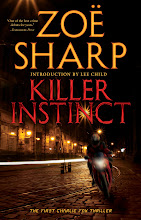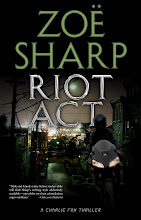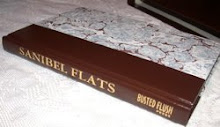LIKE THE RICH, California is different. But not that different. One of the new cities up the coast from me has a motto that says it all. “Just another perfect day in Paradise.” Honest to Christ. People will believe anything, but anyone over the age of twelve should be smart enough not to say it out loud.
Still, that motto runs through my mind every time I look out the big window of my house on the bluff. When the cottage was built, picture windows were the technological equivalent of silicon chips. The glass is so old that it has ripples and tiny bubbles. The flaws add texture to the streamers of gold and red, purple and cobalt that make up the standard southern California sunset. Yes indeed. Another day in Paradise.
But I didn’t say it out loud.
If the ocean at the western edge of California has a failing, it’s a certain lack of texture. Fine color, outstanding light, but not too much character. Out beyond the smog that hugs the water on some summer days, Catalina is the color of unfiltered wine. The island’s blunt stone cliffs are all that save the Gold Coast from being just another pretty face.
What I call the Gold Coast stretches along the California shoreline about fifty miles, from Malibu halfway to San Diego. Even though I invented the name, I’m sure other people must use it, too. It’s the only name that fits. Los Angeles doesn’t really touch the Gold Coast. Sure, L.A. has a couple of windows to the sea in the Palisades and the Marina, and a kind of Polish Corridor to the Port of San Pedro. But the Gold Coast is the rest of Southern California, the outer city to L.A.’s inner sprawl. The Gold Coast’s capital is Newport Beach. Its other major cities include Laguna Beach and the People’s Republic of Santa Monica. Seven million dreams and disillusionments with nothing in common but the Pacific Ocean.
Besides having the most beguiling climate on the North American continent, this stretch of the Pacific rim is characterized by a lack of tradition that’s either alluring or appalling, depending on whose column you’re reading. Houses older than twenty-five years qualify for attention from the local historical society. Basically, everybody is inventing the place as they go and spending a great deal of money in the process. It’s a place where the pecking order changes with the interest rates, which means there is a continuous shoving match for seats above the salt shaker. The competition gets a bit fierce at times. Along the Gold Coast, cocktail parties are a form of blood sport.
I like the place, because I like to invent life as I go along. The Coast, as natives call it, is the magnet that has drawn the best, brightest, meanest, and most aggressive folks in the hemisphere. In the world, if you include the Vietnamese and Iranian contingent. I’m not talking about Boat People or fanatic Muslim students; I’m talking about the people who got out flying their own planeloads of gold while their countries blew up around them.
There is, of course, a social hierarchy on the Gold Coast, but it’s almost an inverted pyramid. The more important the individual, the less likely he is to be recognized as such. Even oil princes keep a low profile. On this scale any elected politician is, by definition, unimportant. No man of real significance would expose himself to such humiliation. The less visible and more wealthy, the more important.
That makes it convenient for me. A low profile has survival value.
Where do I fit in this scheme? I’ve asked myself that question a few times, especially after I got enough money to sit on my butt until it went numb. How much money? Like I said, enough. Enough money is when you never have to think about it. Yeah, I hear you. If you don’t think about it, how do you get it, much less keep it? Simple. You have an uncle three years older than you who dies penniless and leaves you with a steamer trunk full of greasy $20s, $50s, and $100s. Then you happen to be married at the time to a honey-blond tiger shark of an investment banker whose middle name is Midas.
In no time at all you have more money than you can count, an ex-wife, a numb butt, and a desire to kill something. Anything. You’ve discovered that the only thing worse than not liking your work is not having any work to dislike. After you’ve bought everything you thought you ever wanted, drunk ancient and unpronounceable wines, eaten ancient and unpronounceable cuisines, chased and caught the best ass on this or any other coast—what then?
Numb butt, that’s what. And rage. The Chinese knew what they were doing when they cursed their enemies with a single phrase: May your fondest wish come true.
Not that I’m mad at Fiora. She was only doing what she does best—make money. I don’t ask those suicidal questions anymore: Who was wrong and who was right, who was innocent and who was screwed I just sign the contracts she puts in front of me. We get along a lot better now than we did when we were married. I don’t even get mad at her when she spends my money. After all, she earned it, with some help from Uncle Jake, and he is in no position to object to how his ill-gotten gains were laundered.
There is, of course, still some problem with having that much money, particularly when you weren’t raised with it. Being proud of doing nothing was not one of the things they taught me in northern Montana. You may not have to be born into wealth to enjoy it, but indolence is something else. It wasn’t the guilt that got to me. It was the boredom.
For a time I even considered going back to fiddling. Serious fiddling that is. The kind you do with an orchestra. I had been a nine-day wonder with the violin when I was younger. They told me I was good. The best. I might have been, but not to my own goddamned ear. Perfect pitch. Human hands. The twain only meet in my dreams. Long ago I threw that ravishing, bastard violin under the wheels of a southbound Corvette. But with more time, enough money to buy the best . . . ? So I picked up a violin, felt the strings vibrate through my soul as I drew the bow down, and was haunted by a perfection I couldn’t touch.
Maybe when I’m sixty, and perfect pitch is only a memory. Maybe then I’ll play again.
Finally I struck on an idea that comforts me in about the same way libraries comforted Andrew Carnegie. It’s called giving people a hand. I figure that I got lucky and other people didn’t. So I’ll spread my luck around as long as I have it.
That’s how I got the extra crack in my skull, my nose rearranged, and a few odd scars over my body. As the government would put it: Interfering in other people’s business can be hazardous to your health. I keep sawing away, though, fiddling with the world’s distribution of bad and good luck.
I never fool myself into believing I do it for anybody but me, to make me feel better. Well, almost never. Every time I forget, I get myself into trouble. Take my wife. Or my ex-wife, to be precise. And that is both halves of the problem—ex and wife. I am still absolutely mad about the woman that I was once married to. Fiora feels the same way about me, which is why we end up chasing and catching one another every few months. She has the smallest waist and the most beautifully formed breasts of any woman I have ever seen, and, in some ways, she’s the smartest person I know.
Every couple of months, for one night or even two, we have an absolutely wonderful time with one another. Then the old troubles set in. We are cursed. Same appetites, different metabolism. No matter what time or how thoroughly Fiora was bedded the night before, she bounces up from our sheets full of the sharp desire to slay dragons, always not much more than five minutes before or after 6 A.M. She varies about as much as your average vernal equinox.
On the other hand, I’m likely to need a jump start from a twelve-volt system. If I’m out of bed before 9 A.M. it’s only because the day is going to be too hot to run after then. The pounding of three miles on pavement, a modest round of weights and mantras, Mencken or whoever, and I’m ready to face the world. But just barely.
Fiora never understood that about me. And I never understood what it’s like to face dawn with a predatory smile. Midnight, now—yeah, that’s different. Like I said; same appetites, different metabolisms. A fact of life that we both curse with regularity. In another era we probably would have remained married and made one another miserable for forty or fifty years before we reached our angle of mutual repose. But in our modern and supposedly enlightened age, we split the blanket after a few years of trying. I wish to hell I knew whether that was the smart thing to do. So does Fiora. We probably won’t know for another thirty or forty years. All I know is that sometimes she can crush my heart with a single look. She says I can do the same to her. Sometimes. When the times mesh, it’s extraordinary. When they don’t—well, there’s always next time. Isn’t there?
The hope of a next time was why I was sitting in her office on the nineteenth floor of one of the smoked-glass commercial cathedrals along Century Park East in Century City. I was there even though I knew that, at the moment, Fiora was keeping company with a slick European named Volker. Fiora and I were together long enough that we’re possessive, but we owe one another enough that we don’t keep track. So when Fiora called me this morning, at least half an hour before I’m normally human, and asked me to drop by about 11 A.M., I replied with one word:
“Sure.”
I should have stayed in bed....
--------------------------------------------
A. E. Maxwell's first Fiddler & Fiora novel, Just Another Day in Paradise (trade paperback; $13), has just been reprinted, available for the first time in fifteen years! Find copies at your favorite independent, chain, or online bookseller. See the list at the right for some of the indies that support & stock BFP titles.
"David Thompson at Busted Flush Press is bringing back some of [A. E. Maxwell's Fiddler] books, which is going to make a lot of readers happy.... Fiddler is tough, resourceful, and competent. Fiora is beautiful and smart. Maxwell keeps turning up the tension, and the book doesn't pause for breath. If you're not acquainted with the series, this is a great time to change that. If you remember it fondly, now you can read it again in a good-looking trade paperback edition. Check it out." --
Bill Crider, Edgar Award-nominated author of
Murder in Four Parts As usual, running a little behind... Cynthia Smith's second Emma Rhodes high-society mystery, Impolite Society (978-0-9792709-7-0, paperback, $13), is finally going to the printers today. Anyone who's a fan of Nancy Martin (the Blackbird Sisters mysteries), Kerry Greenwood (the Phryne Fisher mysteries), Marne Davis Kellogg (the Kick Keswick mysteries), and Jane Stanton Hitchcock (Social Crimes) should definitely pick up a copy of the first Emma Rhodes book, Noblesse Oblige (978-0-9792709-4-9, paperback, $13). And if you're already a fan, look for Impolite Society in stores in late April.
As usual, running a little behind... Cynthia Smith's second Emma Rhodes high-society mystery, Impolite Society (978-0-9792709-7-0, paperback, $13), is finally going to the printers today. Anyone who's a fan of Nancy Martin (the Blackbird Sisters mysteries), Kerry Greenwood (the Phryne Fisher mysteries), Marne Davis Kellogg (the Kick Keswick mysteries), and Jane Stanton Hitchcock (Social Crimes) should definitely pick up a copy of the first Emma Rhodes book, Noblesse Oblige (978-0-9792709-4-9, paperback, $13). And if you're already a fan, look for Impolite Society in stores in late April.



































.jpg)

